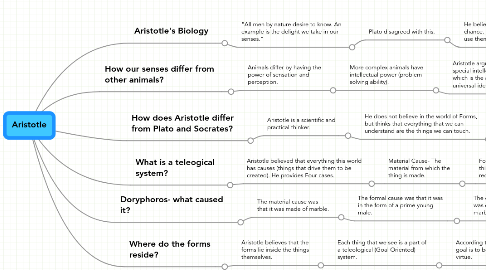
1. Aristotle's Biology
1.1. "All men by nature desire to know. An example is the delight we take in our senses."
1.1.1. Plato disagreed with this.
1.1.1.1. He believed that nature does nothing by chance. We have been given senses to use them to understand the world.
2. How our senses differ from other animals?
2.1. Animals differ by having the power of sensation and perception.
2.1.1. More complex animals have intellectual power (problem solving ability).
2.1.1.1. Aristotle argues that humans have a special intellectual power called reason, which is the ability to come comprehend universal ideas.
3. How does Aristotle differ from Plato and Socrates?
3.1. Aristotle is a scientific and practical thinker.
3.1.1. He does not believe in the world of Forms, but thinks that everything that we can understand are the things we can touch.
3.1.1.1. He creates and applies a scientific model to Philosophical investigation.
4. What is a teleogical system?
4.1. Aristotle believed that everything this world has causes (things that drive them to be created). He provides Four cases.
4.1.1. Material Cause- The material from which the thing is made.
4.1.1.1. Formal Cause- The shape of form a thing must take in order to be recognized.
4.1.1.1.1. Efficient Cause- The actual force used to make things.
5. Doryphoros- what caused it?
5.1. The material cause was that it was made of marble.
5.1.1. The formal cause was that it was in the form of a prime young male.
5.1.1.1. The efficient cause was that it was chizzled from a block of marble.
5.1.1.1.1. The final cause was that it was a didacted sculpture that tought beauty, perfection, and mathematical perfection.
6. Where do the forms reside?
6.1. Aristotle believes that the forms lie inside the things themselves.
6.1.1. Each thing that we see is a part of a teleological (Goal Oriented) system.
6.1.1.1. According to Aristotle- Your goal is to be a person with virtue.
